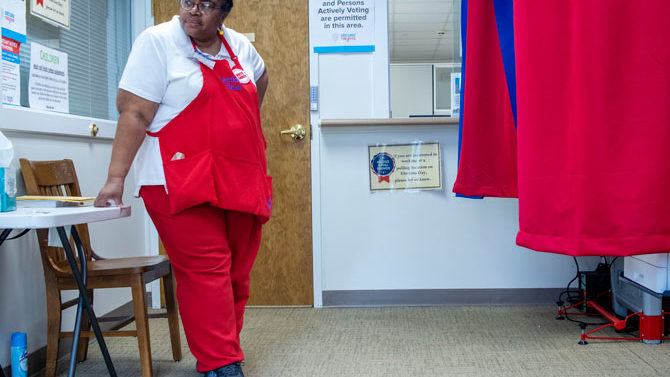Earlier this month, the ACC Board of Elections ordered staff to switch from the new Ballot Marking Device (BMD) voting machines to paper ballots. This was a controversial 3-2 vote, with Chair Jesse Evans, Willa Fambrough and new member Rocky Raffle voting in favor, and Charles Knapper and Patricia Till voting against.
While some people strongly prefer paper ballots because of election security, the reasoning given by board members was instead about voters’ constitutional right to ballot privacy. Paper ballots make this easier to do; inexpensive manila folders suffice to shield voter’s choices from view, which were used in Athens over the past week.
Nevertheless, the decision was controversial. The ACC GOP even circulated a petition to have Evans removed from his position. The board was advised against this action by County Attorney Judd Drake and by Director of Elections Charlotte Sosebee. In Drake’s opinion, it would be very difficult to prove that it was “impossible or impracticable” for Athens to use BMDs as required by state law. Elections in Georgia are done in a uniform manner—counties aren’t free to choose their voting method in this state.
Even so, board members said that it was impossible for them to ensure ballot secrecy for every voter in the county, which is required in the Georgia Constitution. They felt this way due to many other laws and constraints that elections in Georgia must abide by. For example, each polling location must have one voting station per 250 voters. This is more difficult to achieve this year, because the new BMD machines and associated printers take up more space than did previous machines. Their screens are also larger and brighter, meaning voters’ selections might be seen across an entire room. Configuring polling locations therefore had become extremely difficult, with conflicting laws and regulations blocking all the obvious potential set-ups.
Thrown on top of everything was the board’s poor relationship and communication with Sosebee. The board claimed they had not received the sketches that Sosebee’s team had developed regarding potential polling place configurations. They began to lose trust in her ability to guide Athens smoothly through an election, even one as relatively simple as a presidential primary.
The State Elections Board, chaired by Republican Secretary of State Brad Raffensperger, pounced quickly after this vote, calling for a hearing on the matter to take place in Athens. The hearing lasted over seven hours, with many witnesses.
The ACC Board of Election’s defense went blow-by-blow through seemingly every polling location in Athens to detail the difficulties elections workers had in complying with all aspects of current state elections law. Local elections officials had been instructed by the secretary of state’s office to “turn the screens to face the wall” to ensure ballot privacy, but the defense showed how insufficient such advice actually was.
The prosecution’s case was much simpler: Counties are required by law to use the BMDs. They are required to clear whatever hurdles stand in the way, unless it is “impossible or impracticable” to do so. For example, if a power outage or other emergency prevented the machines from being used, paper ballots would be available as a backup.
When BOE Chair Jesse Evans took the stand, he described a potential violation of voter secrecy in Athens. He testified that he himself was able to see the screen of a voting machine from an area that was at times occupied by members of the public. Then the prosecution asked, “Would a set of blinds or other screen work to block your view of the machines and secure voter privacy?” Evans admitted that such an accommodation would have worked. He was unable to describe any violation of voter privacy that was impracticable to fix. Difficult, perhaps, but truly impracticable? Not according to the State Elections Board.
The State Elections Board voted unanimously to issue a cease and desist order to Athens-Clarke County and publicly censured Athens for using paper ballots during the week we did. In addition, they decided to levy a $2,500 fine to recoup some of their legal expenses by a vote of 3-1, as well as an additional fine of $5,000 per day that ACC is not in compliance with their order from this time on. (The Board of Elections may have gotten off light—the fine could have been $5,000 for each of the 1,000 paper ballots cast, or $5 million.) Sosebee had the BMDs back in operation the next day, saving Athens taxpayers from additional fines.
But just days later, Georgia Democrats and Raffensperger suspended early voting over coronavirus fears and pushed the presidential primary back to May 19—the same day as primaries for other offices.
Like what you just read? Support Flagpole by making a donation today. Every dollar you give helps fund our ongoing mission to provide Athens with quality, independent journalism.










